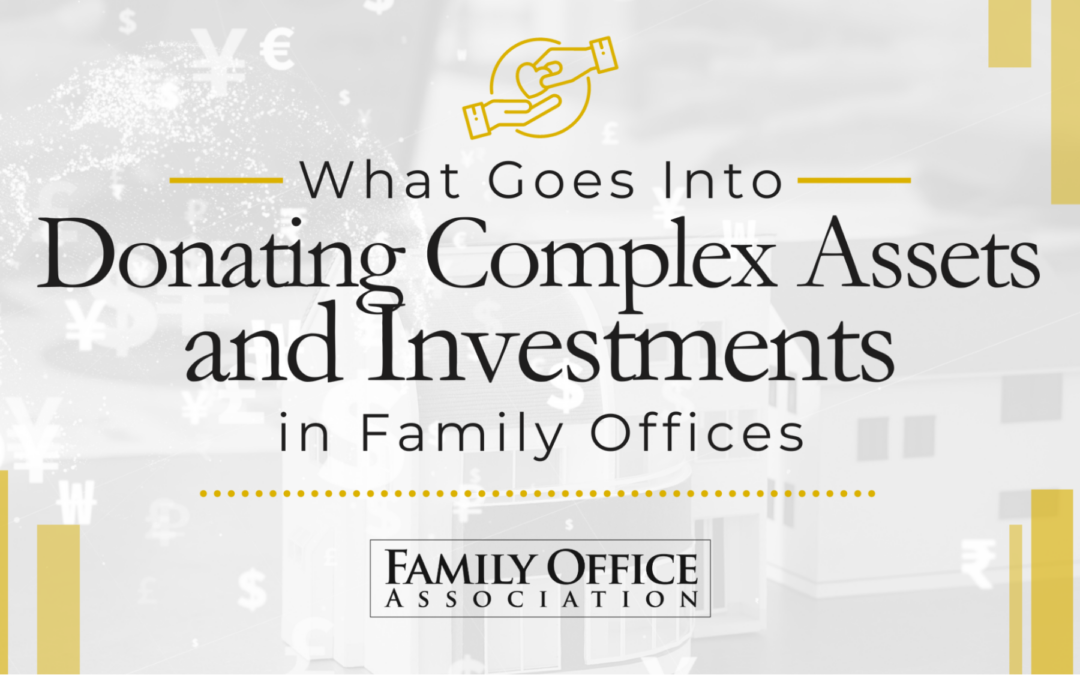The world of philanthropy is constantly evolving. Traditional methods of giving, such as cash donations or stock transfers, are still prevalent, but a new trend is emerging among family offices: donating complex assets and investments. For experienced family offices seeking to maximize their impact, exploring alternative forms of philanthropy can open up new avenues for giving while also offering potential financial benefits and diversification strategies.
Understanding Complex Assets
Complex assets encompass a wide range of non-traditional assets, including real estate, private equity, closely held business interests, intellectual property, and more. These assets often pose challenges regarding valuation, liquidity, and tax implications, but they also represent significant untapped potential for charitable giving.
Possible Motives for Donating Complex Assets
When donating complex assets, family offices can substantially impact charitable causes, leveraging assets that may have otherwise remained dormant or underutilized within their portfolios. Additionally, one of the primary motivations for donating complex assets is the potential tax benefits. By donating appreciated assets directly to charitable organizations, family offices can often receive a tax deduction for the full fair market value of the asset while bypassing capital gains taxes that would have been incurred upon sale. Lastly, for family offices heavily concentrated in certain asset classes, such as public equities, donating complex assets provides an opportunity to diversify their portfolios and reduce risk exposure.
Benefits of Donating Complex Assets
- Strategic Philanthropy
Donating complex assets allows family offices to align their philanthropic efforts with broader investment and wealth management strategies. By strategically selecting assets for donation, they can optimize both financial and social returns.
- Long-Term Value Creation
Unlike cash donations, which provide immediate liquidity to charitable organizations, donating complex assets can facilitate long-term value creation. For example, donating real estate or private equity interests can support sustainable development projects or provide ongoing funding streams for charitable programs.
- Legacy Preservation
Many family offices are driven by a desire to leave a lasting legacy beyond financial wealth. Donating complex assets enables them to support causes reflecting their values and priorities, ensuring their impact extends far into the future.
What to Consider as a Family Office
Before donating complex assets, some details must be considered to ensure the most successful approach. Firstly, family offices must conduct thorough due diligence to assess the asset’s value, potential tax implications, and compatibility with their philanthropic goals. Then, it is wise for your family office to look at the donation structure, as it can have significant implications for both the family office and the receiving charity. Working closely with legal and financial advisors, family offices should explore various donation structures, such as direct transfers, donor-advised funds, or charitable trusts, to determine the most advantageous approach.
Transparent communication is also essential when donating complex assets, especially when dealing with charitable organizations that may not have experience accepting non-traditional assets. Family offices should clearly articulate their intentions, expectations, and any restrictions associated with the donation to ensure alignment and avoid misunderstandings.
Overall, donating complex assets and investments offers experienced family offices a compelling opportunity to amplify their philanthropic impact while also realizing potential financial benefits and diversification strategies. As the philanthropic landscape continues to evolve, embracing innovative approaches to charitable giving will be key to maximizing impact and effecting positive change in society.
If you have further questions or wish to enhance your family office, contact the team at Family Office Association.

